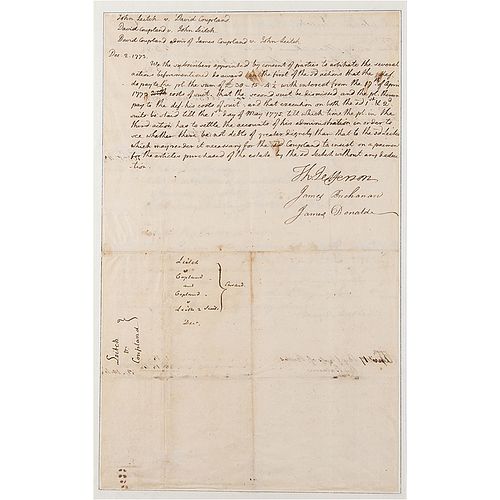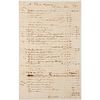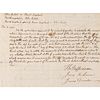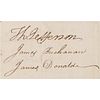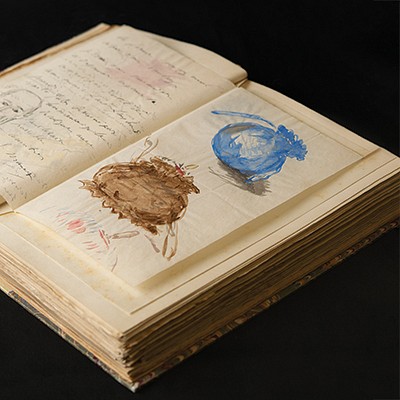Thomas Jefferson ADS (1773) - Rare Early Legal Document
Two ways to bid:
- Leave a max absentee bid and the platform will bid on your behalf up to your maximum bid during the live auction.
- Bid live during the auction and your bids will be submitted real-time to the auctioneer.
Bid Increments
| Price | Bid Increment |
|---|---|
| $0 | $5 |
| $50 | $10 |
| $200 | $25 |
| $500 | $50 |
About Auction
Jun 14, 2023
RR Auction's June Fine Autographs and Artifacts sale boasts over 900 lots, highlighted by a special animation section of 200+ pieces of original production drawings, animation cels, and concept paintings from Disney classics like Snow White, Cinderella, and Alice in Wonderland. = RR Auction support@rrauction.com
- Lot Description
Highly rare ADS, signed “Th: Jefferson,” four pages on two adjoining sheets, 8.75 x 14.25, December 2, 1773. An early legal document recording the decision of Thomas Jefferson as one of three arbitrators commissioned to settle a series of cases between David O. Coupland and John Leitch. Jefferson and the two merchants who served as arbitrators ruled in favor of Leitch but gave Coupland a window of 17 months to settle the accounts of the estate of his uncle James Coupland of Chesterfield County, Virginia.
Jefferson begins his handwritten statement at the top of the last page: “John Leitch v. David Coupland, David Coupland v. John Leitch, David Coupland, admin of James Coupland v. John Leitch, Dec. 2, 1773. We the subscribers appointed by consent of the parties to arbitrate the several actions beforementioned do award in the first of the s’d actions that the def. do pay to the pl. the sum of £30.15.4¼ with interest from the 17th of April 1773 and costs of suit, that the second suit be dismissed and the pl. therein pay to the def. his costs of suit: and that execution on both the s’d 1st & 2d suits be staid till the 1st day of May 1775. till which time the pl. in the third action has to settle the accounts of his administration in order to see whether there be not debts of greater dignity than that to the sd Leitch which may render it necessary for the sd Coupland to insist on a payment for the articles purchased of the estate by the s’d Leitch without any deduction.” Signed neatly at the conclusion by Jefferson, and countersigned by local Virginia merchants James Buchanan and James Donald. In fine condition, with some small old tape repairs to fold splits. Jefferson documents pre-dating the Revolution are rarely seen in the marketplace.
After graduating from the College of William and Mary in 1764, Thomas Jefferson read law under the supervision of George Wythe, for whom he served as a law clerk. Jefferson was admitted to the Virginia Bar in 1767 and practiced for several years until quitting his practice in August 1774 to devote more time to agriculture and architecture.
Although arbitrators did not have to be lawyers, Jefferson’s legal training likely aided him in untangling the complicated debt relationships between Leitch and Coupland in these cases. Coupland was more than a casual acquaintance for Jefferson. Before Dabney Carr, Thomas Jefferson’s brother-in-law, died in May 1773, he named Jefferson as the sole executor of his estate. David Coupland served as one of two sureties on a bond for £4,000 that Jefferson had to file with the Goochland County Court in July 1773 to ensure that he properly administered Carr’s estate. On December 3, 1773, the day after this arbitration award, Jefferson paid David Coupland £4-18-3 for an unspecified reason.
In 1805, future President William Henry Harrison wrote to President Thomas Jefferson, asking him to appoint Harrison’s brother-in-law David O. Coupland as a judge in the Indiana Territory to relieve his ‘embarrassed circumstances.’ There is no evidence that Jefferson made the appointment.
Jefferson was also familiar with his fellow arbitrators. On December 12, 1773, ten days after making this arbitration award, Jefferson received from James Buchanan & Co. £8-3-6 ‘for business done for James Buchanan & Co.’ and on the same day paid the same amount to Buchanan ‘on my own acct.’ In September 1773, Jefferson represented William Meade of Bedford County in a suit brought against him by James Donald of Chesterfield County. Jefferson charged Meade £5 for his services. On December 3rd, the day after this arbitrator’s award, Jefferson received £3 from James Donald. - Shipping Info
-
Bidder is liable for shipping and handling and providing accurate information as to shipping or delivery locations and arranging for such. RR Auction is unable to combine purchases from other auctions or affiliates into one package for shipping purposes. Lots won will be shipped in a commercially reasonable time after payment in good funds for the merchandise and the shipping fees are received or credit extended, except when third-party shipment occurs. Bidder agrees that service and handling charges related to shipping items which are not pre-paid may be charged to a credit card on file with RR Auction. Successful international Bidders shall provide written shipping instructions, including specified Customs declarations, to RR Auction for any lots to be delivered outside of the United States. NOTE: Declaration value shall be the item’(s) hammer price and RR Auction shall use the correct harmonized code for the lot. Domestic Bidders on lots designated for third-party shipment must designate the common carrier, accept risk of loss, and prepay shipping costs.
-
- Buyer's Premium



 EUR
EUR CAD
CAD AUD
AUD GBP
GBP MXN
MXN HKD
HKD CNY
CNY MYR
MYR SEK
SEK SGD
SGD CHF
CHF THB
THB